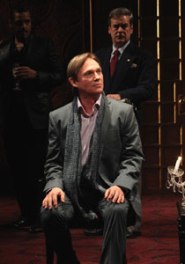Category: "Off-Broadway"
Review: Cactus Flower
Mar 14th

If you’re going to revive an old-fashioned chestnut of a romantic comedy like Abe Burrows’ Cactus Flower, the least you can do is deliver a staging with some sparks. They are sadly lacking in the Off-Broadway revival currently on view at the Westside Theatre, which resembles a summer stock production, only without the usual B-level stars.
Instead, the producers have cast the decidedly unfunny Maxwell Caulfield in the lead role of Julian, the womanizing middle-aged dentist who pretends to be married in order to keep his younger girlfriend’s romantic aspirations at bay. The cast also includes soap opera veteran Lois Robbins as the motherly receptionist who harbors a not-so-secret yen for her boss and young Jenni Barber as the frustrated girlfriend. Suffice it to say that none of them manages to erase the memories of Walter Matthau, Ingrid Bergman and the Oscar-winning Goldie Hawn in the 1969 film version, which itself was no classic.
Burrows adapted his play from a vintage French comedy by Pierre Barillet and Jean-Pierre Gredy. The storyline has indeed proved durable, as it also served as the basis for the recent Adam Sandler/Jennifer Aniston film Just Go With It.
With snappy direction and inspired performers, the play might still prove diverting fun, especially for the matinee lady crowd. But director Michael Bush’s leaden production produces nary a single laugh over the course of its overlong two-and-a-half hours.
Caulfield displays no comic chops whatsoever—he can’t even pull off the called-for double take when Julian spots his receptionist sporting the mink stole that he had given to his girlfriend. Robbins is suitably stuffy in the play’s first half, but is less convincing when required to convey her character’s transformation into giddy sexuality. And Barber, while appealing, is so similar in looks and style to Hawn that the results are merely distracting.
Add to that a supporting cast who ham it unmercifully in the smaller roles and an awkward, heavily wood-paneled set that fails to suggest the required multiple locations. The results feel like cheap champagne that has long lost its fizz.
Westside Theatre, 407 W. 43rd St. 212-239-6200. www.Telecharge.com
Review: Beautiful Burnout
Mar 3rd

If the new theater piece Beautiful Burnout is any indication, the Scottish theater company Frantic Assembly is aptly named. This work by Bryony Lavery (Frozen) set in a boxing gym is a whirlwind-paced portrait of young pugilists training and sparring. Superbly staged and choreographed, it’s fascinating to look at. But it offers little in the way of meaningful drama to complement its striking movement.
A co-production with the National Theatre of Scotland, it’s directed and choreographed by Scott Graham and Steven Hoggett. The latter also served as choreographer for Black Watch, the equally kinetic but far more substantial piece that was presented to great acclaim at St. Ann’s Warehouse a few seasons back.
For this production, the audience sits on three sides of the stage outfitted as a boxing ring. Through a fast-paced series of short scenes and monologues, we are introduced to the characters, including Bobby Burgess (Ewan Stewart), the hard-driving, tough-talking trainer; the three young male hopefuls under his tutelage (Taqi Nazeer, Eddie Kay, Henry Pettigew); the female boxer (Vicki Manderson) who is no less fierce than her male counterparts; and one of the boxer’s mother (Blythe Duff), who offers acerbic commentary throughout.
The sketchy narrative and characters seem mere afterthoughts to the staging, which offers a plethora of intricately choreographed training and fighting sequences, all scored to throbbing techno music by the band Underworld. The sensory assault is further amplified by an array of striking images projected on video monitors.
Although the fierce commitment and physical prowess demonstrated by the performers is highly impressive, it’s not enough to prevent the proceedings from becoming tedious. Beautiful Burnout thankfully avoids most of the clichés endemic to so many boxing dramas, but it also offers little to make us care about its would-be warriors.
St. Ann’s Warehouse, 38 Water St., Brooklyn. 718-254-8779. www.stannswarehouse.org.
Review: Timon of Athens
Mar 2nd

It’s easy to see why the Public Theater has chosen William Shakespeare’s--and possibly Thomas Middleton’s, according to some scholars--Timon of Athens as the inaugural productions of its Public LAB SHAKESPEARE series. This rarely performed drama, one of the lesser entries in the Bard’s canon, has definitely taken on a new resonance in these financially troubled times.
Richard Thomas delivers an impressive performance in the title role of an Athenian nobleman who recklessly showers his friends and associates with money and other forms of largesse. When his financial fortunes change, he’s quickly abandoned by nearly everyone in his orbit. In the second act, he has been reduced to a misanthropic, ranting hermit sequestered in a cave.
Director Barry Edelstein’s decidedly irreverent production delivers an almost satirical take on the play. Set in the vaguely contemporary present with its characters wearing tacky, ‘70s era costumes, it depicts a greedy society whose members are besotted by indulgence and excess.
When Timon hosts a dinner party, his guests are served with a bowl of caviar so huge that it rivals Al Pacino’s gargantuan stash of cocaine in Scarface. As entertainment, he presents a screening of the film It’s a Wonderful Life, reciting one of its most famous lines, “No man is a failure who has friends” before the screen changes to reveal a scene from a vintage stag film. As a visual indicator of the fragile state of Timon’s finances, fallen chandeliers litter the floor. And key emotional moments are signaled by the wailings of an electric guitar.
These gimmicky aspects tend to work against the simple power of the play, which despite its lack of complexity nonetheless exerts a certain fascination. Fortunately, the acting makes up for it. Thomas, an inspired choice, is so inherently likeable a performer that Timon’s frantic eagerness to please seems utterly natural, while his descent into bitter, raging madness is all the more powerful.
He receives excellent support from the leading members of the ensemble, including Mark Nelson as Timon’s loyal steward; Max Casella as a cynical philosopher; and Reg E. Cathey as a rebellious military officer. Unfortunately, many of the smaller supporting roles are played as jokey caricatures that are not nearly as amusing as intended.
Credit must go to the Public for presenting this little seen play, especially considering that tickets can be had for the bargain price of only $15. Better act fast, though—the production runs only through this Sunday.
Public Theater, 425 Lafayette St. 212-967-7555. Through Mar. 6. www.publictheater.org
Review: Diary of a Madman
Feb 25th

As he’s demonstrated in such films as Shine and the recent Broadway production of Ionesco’s Exit the King, there are few actors as adept at playing crazy characters as Geoffrey Rush. Now starring in the titular role in The Diary of a Madman, the performer delivers an inspired tour-de-force turn that plays like a demented vaudeville act.
Set in 19th century St. Petersburg, the piece depicts the lapse into psychosis of Aksentii Ivanovich Poprishchin, a low-level, pencil-pushing bureaucrat endlessly frustrated by the drudgery of his demeaning job. At night he retreats to the safety of his attic garret, where he pours out his increasingly bizarre fantasies into his journal. In between his exhausting exhortations, he’s attended to by his solicitous Finnish housekeeper (Yael Stone).
Decrying the dictatorial demands of his boss and indulging in his fantasies of an imagined love affair between him and the office director’s beautiful daughter, he regales us with such fantasies as the supposed dialogue between two neighborhood dogs and his dawning realization that he’s actually the king of Spain.
This production, which originated more than two decades ago at Sydney’s Belvoir theater company, is less effective as a dramatization of Gogol’s classic 1835 short story than as a vehicle for its star’s protean talents. Sporting a bizarre tuft of garish red hair and increasingly outlandish costumes, Rush delivers an endlessly physical performance in which his extreme bodily contortions provide a visual correlative to his character’s over-the-top rantings.
While the performance is certainly entertaining, neither it nor the dramatization—by David Holman, director Neil Armfield and Rush himself—ultimately cuts very deep. Although highly effective in conveying the comic extremities of the character’s eccentricities, it is far less so in its attempt to harrowingly depict his full-blown descent into madness.
Adding mightily to the show’s impact are its superb technical elements, including Catherine Martin’s set design with its blood red walls and claustrophobic green ceiling; Mark Shelton’s haunting lighting, which creates shadows that seem to take on a life of their own; and the evocative sound effects and music, created by a pair of musicians located at the side of the stage.
It’s a marvelous showcase, to be sure, for this supremely talented actor, Oscar nominated for his far more down-to-earth performance in the hit film The King’s Speech. But the production’s effects are all on the surface; at the end, we care far too little about this tragic figure, despite the undeniable laughs he’s provided along the way.
BAM Harvey Theater, 651 Fulton St., Brooklyn. 718-636-4100. Through Mar. 12.
Review: Interviewing the Audience
Feb 17th
 Everybody has a story, but some are more interesting than others. So you take your chances with Zach Helm’s Interviewing the Audience, currently at the Vineyard Theatre. Based on a concept created by the late Spalding Gray, this theater piece is akin to tuning in to a random episode of Dr. Phil.
Everybody has a story, but some are more interesting than others. So you take your chances with Zach Helm’s Interviewing the Audience, currently at the Vineyard Theatre. Based on a concept created by the late Spalding Gray, this theater piece is akin to tuning in to a random episode of Dr. Phil.
In this theatrical exercise, Helm--the screenwriter of Stranger Than Fiction and Mr. Magorium’s Wonder Emporium (he also directed the latter)—randomly selects audience members and brings them onstage for impromptu chats. Since every performance will be entirely different, the results are inevitably varied.
At the show caught, the subjects included a pathologically shy 16-year-old who confessed to seeing a therapist for her social anxiety; a Brazilian college student visiting the U.S.A.; and an older woman who talked at length about her relationship with her daughter living in Colorado.
The unassuming Helm, who thankfully takes no for an answer should you choose to decline his invitation—“We have a lot of voyeurs here tonight,” he commented upon seeing the large number of hands raised by those who didn’t wish to participate—takes an almost therapeutic approach to his gentle interrogations. Unlike Gray, who added a layer of irony to his questioning, he projects an attitude of sincere caring.
He begins each talk with the same question, “How is it that you came to be at the theater?” After that, he wings it, although he frequently finds interest in articles of clothes the person is wearing. In the case of the withdrawn teen, who came to the stage wearing a wolf’s head hat, complete with ears, that nearly covered her entire face, it provided plenty of fodder for conversation.
There is certainly something gripping about people suddenly opening up about their lives in front of a large group of strangers, and the solicitude expressed by Helm was frequently touching. He adds a personal level to the proceedings by frequently revealing intimate details about his own life.
Since none of the three women at the performance caught were particularly interesting or articulate—the Brazilian warned up front that her English language skills were lacking—the results were somewhat less than compelling. But in a spontaneous atmosphere such as this, lightning is bound to strike, so your experience may be far different. As much social experiment as it is theater, Interviewing the Audience is a slight but undeniably fascinating experience.
Vineyard Theatre, 108 E. 15th St. 212-353-0303. Through Feb. 27.